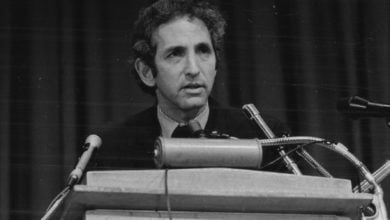 Photo: Roberto J. Mercado |
The son of a railroad worker, Davis was born in Cogdell, Georgia in 1917, the eldest of five children. Davis devoted his entire life to the struggle for African American equality in the world of entertainment and beyond.
Shortly after his death, Davis’ colleague and fellow activist Harry Belafonte told the Los Angeles Times, “He walked in the shadow of men like Paul Robeson, W.E.B. Du Bois, Martin Luther King and Malcolm X. He was the embodiment of all those courageous people. I think he worked very hard at passing on to subsequent generations not only a deep and rich sense of their history but encouraged them to become more noble in their demand of life, governance and society. I think African Americans in particular are huge beneficiaries of his presence in our midst.”
Activism in the service of justice
Davis and his wife, Ruby Dee, participated in the cutting edge struggles of the last century. During the anti-communist McCarthy period in the 1950s, Davis refused to capitulate to the hysteria of the day. He openly supported the great Paul Robeson when others ran for cover.
Active throughout the civil rights movement, Davis participated in the 1963 March on Washington.
Davis delivered a moving and militant eulogy at the funeral of Malcolm X after his assassination in 1965: “Did you ever talk to Brother Malcolm? Did you ever touch him, or have him smile at you? Did you ever really listen to him? Did he ever do a mean thing? Was he ever himself associated with violence or any public disturbance?
“For if you did, you would know why we must honor him: Malcolm was our manhood, our black manhood! This was his meaning to his people. And, in honoring him, we honor the best in ourselves. … And we will know him for what he was and is—a prince—our own black shining prince!—who didn’t hesitate to die, because he loved us so.”
Throughout his prolific career, Davis wrote, acted and directed plays and films about the struggles of African Americans in a racist society. “I am essentially a storyteller,” he said, “and the story I want to tell is about Black people. Sometimes I sing the story, sometimes I dance it, sometimes I tell tall tales about it. But I always want to share my great satisfaction at being a Black man at this time in history.”
Davis attended countless rallies and demonstrations, always lending his voice to progressive struggles. He became a leading voice in the ongoing struggle to free Black journalist Mumia Abu-Jamal, who has spent decades in prison and on death row because of a racist frame-up.
Internationalist in spirit, Davis fought against war and imperialist aggression around the world, calling for an end to U.S. policies in Latin America, Africa and the Middle East. He was also a strong supporter of the Cuban revolution and the campaign to free the five Cuban patriots unjustly held in U.S. prisons.
A legacy of talent and struggle
Davis never gave up or walked away from the struggles of working people for better living standards and justice at the workplace.
The Screen Actors Guild issued a tribute to their union brother on Feb. 4, stating that, “Along with his remarkable wife, Ruby Dee, Ossie Davis’ impact on America can be seen not only in his rich body of creative works, but equally so as a passionate advocate for social justice and human dignity.”
In New York City, Actors’ Equity Association called Davis “an icon in the American theater.” House lights for Broadway shows were dimmed at curtain time.
Millions of freedom-loving people around the world will remember the legacy of Ossie Davis as the struggle for justice and equality continues to unfold.






